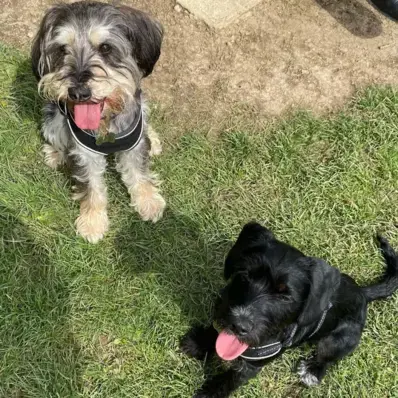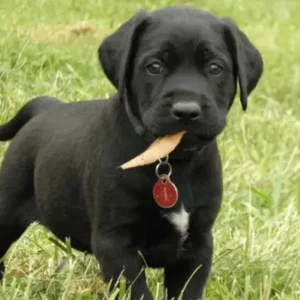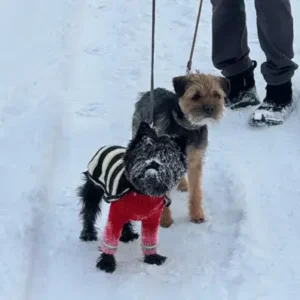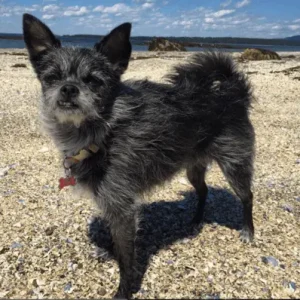Schnocker History/Origin
As a relatively new hybrid dog breed, the Schnocker’s exact history isn’t well-documented. It is believed to have emerged in the United States in the late ‘90s to early 2000s.
Examining the parent breeds provides insight into its heritage. The Miniature Schnauzer, originating in Germany, was bred for vermin hunting and dates back to the 1400s. The Cocker Spaniel, esteemed for its prowess in hunting and retrieving game birds both on land and water, also has a long history.
The Miniature Schnauzer was officially recognized by the American Kennel Club in 1926, and the Cocker Spaniel followed in 1948. In contrast, the Schnocker, as a hybrid breed, is acknowledged by the American Canine Hybrid Club.
Schnocker Personality
The Schnocker is one of the dog breeds renowned for its sweet and affectionate personality. This breed thrives on forming deep, loving bonds with its family members. Schnockers are always eager to be part of the action. They love engaging in playful romps. This makes them perfect company during your favorite TV marathon.
- Temperament
Its high energy and excitable temperament characterize the Schnocker. This lively breed requires plenty of playtime and physical exercise to burn off its abundant energy. Even after a full day of activity, Schnockers are likely to be ready for more play or exercise. Additionally, their intelligence means they benefit from mental stimulation, so interactive toys, training, and activities that challenge their minds are essential to keep them engaged and satisfied.
- Potential Challenges
While Schnockers make great apartment pets due to their compact size and strong bond with their owners, their energetic and excitable nature can present challenges. These dogs require significant daily exercise and mental stimulation to stay happy and healthy.
Without ample playtime and interactive activities, Schnockers may become restless or bored, which can lead to behavioral issues. Their high energy levels mean they need more attention and engagement than other breeds, so prospective owners should be prepared to dedicate time and effort to meet their Schnocker’s needs.
Schnocker Physical Appearance
The Schnocker has a well-balanced, sturdy build with a friendly, expressive face. Its alert eyes and floppy ears add to its charming appearance. These features reflect its Miniature Schnauzer and Cocker Spaniel parentage.
- Size
The Schnocker is a small-to-medium-sized dog, with most weighing between 13 and 20 pounds and standing 12 to 15 inches tall. Female Schnockers are often smaller than their male counterparts.
- Coat color
The Schnocker’s coat is usually medium in length with a wavy texture and moderate density. It typically features a blend of colors such as brown, black, cream, gray, and white. This variety gives the Schnocker a distinctive and appealing appearance.
Black Schnocker- Source: meet.the.schnockers
Cream Schnocker- Source: Pinterest
Grey and white Schnocker- Source: meet.the.schnockers
Schnocker Gender Differences
The only notable difference between male and female Schnockers is the slight size variation, with females typically being a bit smaller and lighter. Beyond this, their personalities and behaviors are largely influenced by training and socialization rather than gender.
Schnocker Feed/Nutrition
An ideal diet for a Schnocker should be tailored to a small-to-medium-sized dog with moderate energy levels. Maintaining a healthy diet is crucial, as overeating can lead to weight gain and related health issues, especially if the dog doesn’t get enough exercise.
As with all dogs, a Schnocker’s dietary needs will evolve from puppyhood through adulthood and into their senior years. It’s best to consult your veterinarian for personalized dietary recommendations, considering the variations in individual dogs’ weight, energy, and health.
Watermelon can be offered as an occasional treat—just ensure the seeds and rind are removed to avoid digestive issues.
Schnocker Health
Schnockers are generally healthy dogs but can be prone to various medical conditions. Regular wellness visits to the vet are essential for maintaining their health.
- Retinal Dysplasia: This condition affects the retina and can lead to vision problems or blindness. Regular eye exams can help detect issues early and manage them effectively.
- Diabetes: Diabetes can cause excessive thirst, frequent urination, and weight loss. Maintaining a balanced diet and regular exercise can help manage the risk, and early detection is crucial.
- Portosystemic Shunt: This is a liver condition where blood bypasses the liver, leading to potential liver damage. Regular veterinary check-ups and a proper diet can help manage this condition.
- Seborrhea: This skin condition causes flaky, itchy skin and can lead to infections. Regular grooming and a good diet can help prevent and manage seborrhea.
- Ear and Eye Infections: Schnockers are prone to infections due to their floppy ears and sensitive eyes. Regular cleaning and check-ups can prevent infections and maintain ear and eye health.
- Sick Sinus Syndrome: This condition affects the heart and can lead to irregular heartbeats. Regular veterinary care and monitoring can help manage the symptoms.
Schnocker Care and Grooming
Despite their smaller size and sweet nature, Schnockers require significant exercise. Aim for at least an hour of outdoor activity each day, and incorporate interactive toys and agility training to keep them mentally engaged.
The Schnocker has minimal health care needs. It generally maintains good dental hygiene, requiring tooth brushing only twice a week. Although not a heavy shedder, regular brushing once or twice a week will help keep their coat clean and prevent mats and debris.
Adaptable to most climates, the Schnocker usually adjusts well to various weather conditions. However, in very hot climates, ensure they have ample shade and fresh water to stay comfortable. House training your dog early with consistent routines, positive reinforcement, and patience can help establish good habits quickly.
Schnocker Rescue Groups
Schnockers can often be found in rescues dedicated to their parent breeds, the Miniature Schnauzer and Cocker Spaniel. These breed-specific rescues may have Schnockers available for adoption, providing a great opportunity to give a loving home to a mixed-breed dog in need.
Schnocker Price
The price of a Schnocker typically ranges from $500 to $2,500, depending on factors such as breeder reputation, pedigree, and location.
Schnockers can sometimes be found through breeders of their parent breeds, the Miniature Schnauzer and Cocker Spaniel. However, adopting from shelters or breed-specific rescues is a more ethical choice, offering a loving home to a dog in need and reducing the demand for breeders.
Interesting Facts
- Many Schnockers excel in agility training due to their athletic backgrounds, inherited from their parent’s hunting and retrieving skills.
- The Schnocker’s coat can come in a wide range of colors and patterns, reflecting the diverse color palettes of their parent breeds.
Best For
The Schnocker is perfect for active individuals or families who can offer plenty of exercise and playtime. They thrive on attention and affection, making them great companions for those who enjoy loving and engaging pets. They also adapt well to apartment living, provided their exercise needs are met.
Top Names
| Male Schnocker Names | Female Schnocker Names |
| Max | Bella |
| Charlie | Luna |
| Toby | Daisy |
| Oscar | Ruby |
| Finn | Zoe |









 Cocker Spaniel- Source:
Cocker Spaniel- Source:  Miniature Schnauzer- Source:
Miniature Schnauzer- Source: 

 Black Schnocker- Source:
Black Schnocker- Source:  Cream Schnocker- Source:
Cream Schnocker- Source:  Grey and white Schnocker- Source:
Grey and white Schnocker- Source: 







